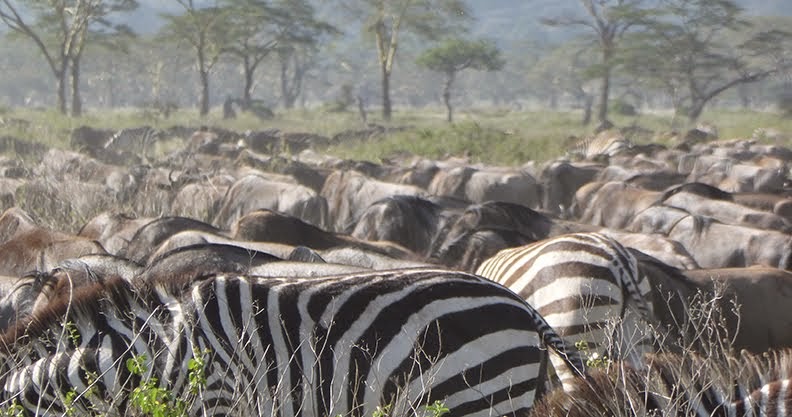
But, just like our lives, this was not all paradise. The large predators were also here. We saw one rogue male lion, scars on his nose and blood on his teeth, with his fresh kill — a young Cape Africa buffalo — next to the gravel roadway. The leopards were in wooded sections of the park, stretching out on the limb of one of the tall, thorned acacia trees, waiting for nightfall and their hunt. In the tall grass, a cheetah patiently eyed a Thomson's gazelle, a black racing stripe on its side. We didn't wait long enough to see if it could outrun the cat.
We encountered more than one lion sleeping off a heavy kill. One male, his mane ruffling in the wind, lay spoon fashion with his scarred mate in a small sequestered area among rocky outcroppings. Their ears occasionally twitched at insects but they appeared undaunted by our presence in our jeep.
The scenes stirred something in my bones, my blood, my very genes. This sense of witnessing how the world must have been once at the very beginning. The Serengeti is not far from the Olduvai Gorge where Mary Leakey in 1978 discovered the footprints of our earliest known ancestors, the hominids known as Australopithecenes from more than three million years ago. No cattle drivers or farmers here. The animals were doing quite well at maintaining nature's balance all on their own. I felt humbled, reverent and in awe.
But, I also recognized how raw and dangerous and right there in front of us all this was. The camp for our group of 16 was in a Serengeti clearing up from the woods along a river. We had many amenities including three-course meals. But we stayed in tents, movable tents erected over wooden stays. Each came with a flushable toilet and a shower of sorts: solar heated water tumbled out of bucket above you.
But they were still tents. That meant the thickness of cloth between us and the wilderness. Tents that zipped shut, top to bottom and side to side. That first night after our meal in the dining tent, I asked one of the Tanzanians operating the camp, "You do patrols during the night, don't you?"
"Oh, no," he answered. "We don't have any guns. If something attacks, then we are doing something very wrong. After we zip you in, we don't go out. This is the animals' home."
"Oh, no," he answered. "We don't have any guns. If something attacks, then we are doing something very wrong. After we zip you in, we don't go out. This is the animals' home."
Instead, they gave us a whistle, a little silver whistle similar to those English police officers once carried in England. But, we were under orders not to blow it unless 'an animal is in your tent.' Or we could get killed when we come running.
All that was in my head when the camp staff, sweeping the path with their flashlights, walked us back to our tents in the darkness. Right before I was zipped in, the man asked me, "Do you hear the lion?" He reminded me, just like the written instructions inside the tent, not to go out till daylight.
No worry on that part. Foolish as it felt, I stuffed a dirty sock in the little hole left between the perpendicular zippers. I'd read about Black Mambas, the fastest snakes on earth. Didn't help that the guides said the snakes don't want to be around us. I'd also read that 20,000 thousand people die every year in Africa from snake bites.
I had no choice but to trust my guides. Once I turned out the weak solar powered lamp overhead, my world was totally dark. I didn't move the first few hours, listening and yes, heard the "hrumph , hrumph" of the lions calling to each other in the coolness of the night, followed by the skittish "whoop, whoop" of the hyena. The spotted version of the hyena, the very kind we'd seen during our game ride can weigh up to 180 pounds and they eat their prey while still alive. Then parts of the tent, rolled up to create windows out of screening, flapped in the wind.
More Articles
- The Beige Book Summary of Commentary on Current Economic Conditions By Federal Reserve District Wednesday November 30, 2022
- A la Frank Sinatra: "Come Fly With Me", U.S. Department of Transportation Airline Customer Service Dashboard
- A Ferocious Predator of Its Day: T. Rex’s Short Arms May Have Lowered Risk of Bites During Feeding Frenzies
- A Tisket, A Tusket: A New Study and Fossil Dental Exams Reveal How Tusks First Evolved
- Adrienne G. Cannon Writes: Those Lonely Days
- From the CDC: When You've Been Fully Vaccinated You Can ........For the 30,000,000 Who Have Been Vaccinated
- Jill Norgren Reviews a New Inspector Gamache Mystery: All the Devils Are Here
- FactCheck Post: The Facts on Trump’s Travel Restrictions: "We Don't Have a Travel Ban; We Have a Travel Band-Aid Right Now"
- Heard of the Novel Corona Virus Before? The New England Journal of Medicine's Free Reading Lists and the W.H.O.'s Statement
- Horse, Horse, Tiger, Tiger; It's the Tone of the Character That Makes the Word






